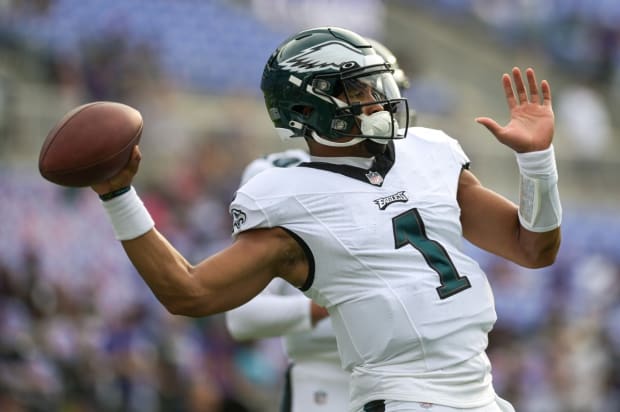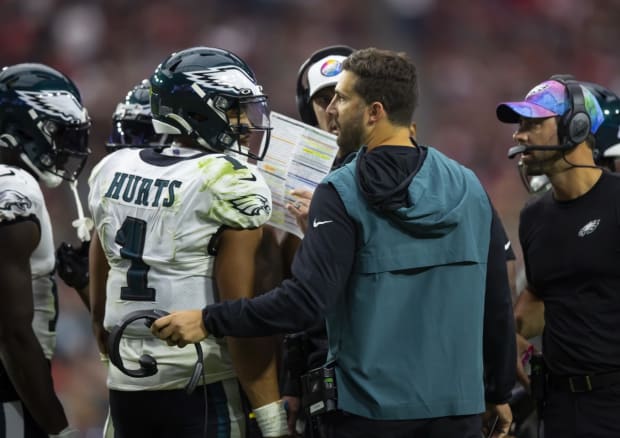More from Albert Breer: The Colts Are Creating an Empowered Pro in Anthony Richardson | Takeaways: Drafting a QB May Be More of a Gamble Than Ever | Trevor Lawrence’s Path: Think Brett Favre, Dan Marino and Tom Brady
The last question I had for Jalen Hurts elicited the shortest, and maybe most interesting, answer he’d give me. For a few minutes, after the Eagles’ joint practice with the Colts, the quarterback and I had talked about his progress, his background, and where he and Philadelphia are headed, coming off an NFC championship and Super Bowl loss in 2022.
And in discussing how far he’s come already, I said that he had to have hated—back when he was at Alabama, and even Oklahoma, and even after winning a national title and making it to New York as a Heisman finalist—people pigeonholing him as a “running quarterback.”
“I didn’t,” he says, smiling as he walked away. “It’s the reason why I am who I am.”
So what does he mean by that? The answer brings plenty of insight into who he is.

Tommy Gilligan/USA TODAY Sports
Hurts was intentionally leaving his words open to interpretation, as if that reason was obvious to him, and up to everyone else to figure out. My interpretation, then, was that Hurts doesn’t operate in the boxes that people try to put him in as a player.
It’s a tough point to argue with him. In fact, that, to me, is a big part of why the Eagles didn’t skip a beat in giving him (at the time) the richest contract (five-year, $255 million extension) an NFL quarterback has ever gotten, three years after selecting him in the second round.
It’s because there’s no telling just where this story is going next.
Proof of that isn’t just in that he’s made so much progress over the past three years, going from second-round project to backup-spot player to tentative starter to affirmed starter to the Super Bowl and confirmed franchise quarterback. It’s in the minute areas in which that progress has come—specifically, the boring parts of quarterbacking that few without a key card to an NFL facility would know.
In particular, it’s how Hurts improved his anticipation, accuracy and pocket presence. It happened through changing his body to become a more fluid thrower, which allowed for him to throw more accurately. That, added to tireless work in learning the game at a deeper level, allowed him to threaten defenses with his arm, rather than his feet.
In short, you tell him he can’t improve in those areas, and he’ll tell you more than just that you’re wrong. He’ll carve out a path to prove you wrong, then follow that path, regardless of how long and winding the path may have to be.
“It’s just a slow evolution and slowly but surely making progress,” Hurts says. “I’ve had that mentality since I picked up a ball and since I played in high school. My purpose and my dream has always remained the same. Now, you play a different level and you go to new heights and you get a lot of attention that comes with it. The purpose always remains.”
The purpose, again, brings a lot of details. But at its core, it’s easy to understand—just to consistently and relentlessly get better.
And Hurts has, for a reason.
“It’s his drive and work ethic,” Eagles coach Nick Sirianni says. “God willing, he’s going to reach his ceiling because of who he is as a person. What’s crazy is, you ask a question about Jalen Hurts, the answer to the question is the person. Before you talk about any of the plays that he makes, the throwing, the running, the checks, anything that he does, the first and foremost thing that you talk about is his leadership, his drive to be great.
“That tells you how special those other things are. If anyone’s going to reach their ceiling, it’s going to be Jalen. He’s improved because he’s a tireless worker. He’s coachable. He’s self-aware. All he cares about is getting better. It’s really something else that he just wants to be great, and he’s willing to sacrifice things to be great.”
As for an example of that work ethic, rather than raising one story, Sirianni pointed to the totality of them all.
“What I think is a good story is it’s monotonous,” he continues. “That’s mental toughness, in my mind. When it’s the same day every day and, Boom, O.K., cool, I’m doing this again today and I’m getting better at this again today. That’s what I think is really cool.”
Interestingly enough, such monotony—in getting to do things over again—might actually be where his next steps come.

Mark J. Rebilas/USA TODAY Sports
In college, Hurts played for four different play-callers—Lane Kiffin, Brian Daboll, Mike Locksley at Alabama, and Lincoln Riley at Oklahoma. Then, in 2020, he worked under Doug Pederson as an Eagles rookie, before winding up with Sirianni and Shane Steichen in ’21.
That, for any quarterback, would be a lot of change over six years. And Hurts, looking back now, sees benefit in having done it that way.
"Absolutely,” he says. “I have no other option than to take benefit from it. Those are not situations that you hope for. Everybody loves stability. Everybody loves consistency. That’s something that I never really had from a coaching standpoint.”
To a reasonable degree, he does now.
Sirianni, deeply involved in the offense if no longer its play-caller, is still his coach. Steichen is now in Indianapolis, but in his place as offensive coordinator is Brian Johnson, who played high school ball for Hurts’s dad, Averion Sr., and has known Jalen since he was a toddler. Johnson was also his position coach last year. And Philly was able to keep pass-game coordinator Kevin Patullo around, too.
So now he’ll have stability with guys carrying institutional knowledge on how those years came together for Hurts. And his coaches get to build off that, too.
"You know what he likes because you’ve had these conversations,” Sirianni says. “It’s like you’re dating your wife—you get to know her better and better and better. You just get to know her like that. It’s the same thing. I’d say the first year, we were trying to find our way of what we knew he liked and what he’d be good at. You figure it out and you go on a roll. You just continue on that in the second year, and you’re going to try and continue on that in the third year while also changing it up enough where you’re not predictable.
“I just see him continuing to grow in who he is as a player and his knowledge of plays.”
What might that mean for Hurts as a player?
His answer is coy, and authentic, in that he doesn’t see a single blueprint since there really wasn’t one for his arrival as an NFL quarterback.
"I’m not sure, because I know in reality, no one expected me to be here today,” he says, grinning again. “Y’all watch and see—I’ll do what I do.”
There was no singular key moment to all of this, because Hurts sees them all as key moments.
“I’m older. I’m wiser. I have more experience, and I play with those experiences,” he says, when asked how different he is now versus three years ago. “I haven’t grown or shrunk. I think it all comes with time. The game evolves. You look at the greats, Peyton [Manning] and Tom Brady, those two guys, for example, when they came into the league and when they left the league, their games were totally different.
“That’s how it’s supposed to be.”
And knowing and living that, indeed, is the reason why Hurts is who he is.







